Fancy pigeon refers to any breed of domestic pigeon, which is a domesticated form of the wild rock dove. They are bred by pigeon fanciers for various traits relating to size, shape, color, and behavior, and often exhibited at pigeon shows, fairs and other livestock exhibits.

The Fantail is a popular breed of fancy pigeon. It is characterised by a fan-shaped tail composed of 30 to 40 feathers, abnormally more than most members of the dove and pigeon family, which usually have 12 to 14 tail feathers. The breed is thought to have originated in Pakistan, India, China, Japan or Spain. There are several subvarieties, such as the English Fantail, the Indian Fantail, and the Thai Fantail. Charles Darwin used it as one of the examples in the first chapter of his book On the Origin of Species. He believed it was a descendant of the rock dove.
The tippler is a breed of domestic pigeon bred to participate in endurance competitions. Flying results of up to 22 hours (non-stop) have been reported.

A roller pigeon is a domesticated breed or variety of pigeon that has been selected for its ability to tumble or roll in the air. Varieties of roller pigeons include:

The Danzig Highflyer is a breed of fancy pigeon developed over many years of selective breeding. Danzig Highflyers, along with other varieties of domesticated pigeons, are all descendants from the rock pigeon. There are two major variates of the Danzig Highflyer: ones that are bred for show, and others as pets for flying.

Tumbler pigeons are varieties of domesticated pigeons that are descendants of the rock dove that have been selected for their ability to tumble or roll over backwards in flight.
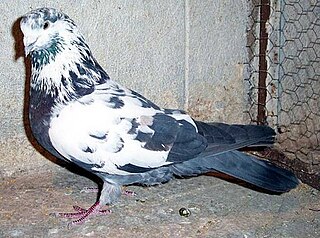
The Iranian Highflying Tumbler pigeon also known as "Persian Highflying Tumbler" in Europe and "Tehrani" in Iran is a breed of domestic pigeon bred in Iran for performance and endurance flying competitions. They fly at a very high altitude and at times out of sight. The tumbling is nothing like a Birmingham Roller, individual flips, occasionally hovering before it does the flip.

The Trumpeter breeds of fancy pigeon are so named because of their unique vocalizations which sound vaguely like low laughter. Wendell Levi describes this trumpeting vocalization in his book The Pigeon. There are several domesticated varieties that possess this "trumpeting" ability to various degrees. Some of the more popular are:

The Jacobin is a breed of fancy pigeon developed over many years of selective breeding that originated in Asia. Jacobins, along with other varieties of domesticated pigeons, are all descendants of the rock pigeon. It is in the Asian feather and voice pigeon show group. The breed is known for its feathered hood over its head.
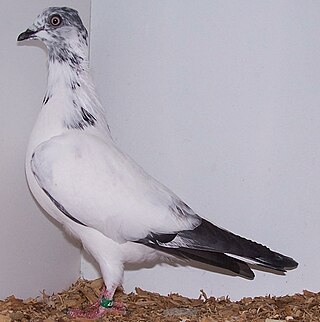
Flying/Sporting is the name of one of three main groupings of breeds of domesticated pigeons used by pigeon fanciers in the United States. The other two are Fancy and Utility.

Utility pigeons are domesticated pigeons bred to be a source of meat called squab. Squabs have been used as a food in many nations for centuries. They were bred to breed and grow quickly. Because they are bred for squab production, conformation to a show standard is usually deemed unimportant.
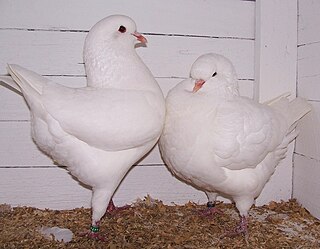
The King pigeon is a breed of pigeon developed over many years of selective breeding primarily as a utility breed. Kings along with other varieties of domesticated pigeons are all descendants from the rock dove.

The Szegedin Highflyer is a breed of fancy pigeon developed over many years of selective breeding. Szegedin Highflyers, along with other varieties of domesticated pigeons, are all descendants from the rock pigeon . The breed belongs to the Flying/Sporting pigeons group.

The Budapest Highflyer is a breed of fancy pigeon developed over many years of selective breeding. Budapest Highflyers, along with other varieties of domesticated pigeons, are all descendants from the rock pigeon . The breed is the most popular in its native Hungary.

The Stralsund Highflyer is a breed of fancy pigeon developed over many years of selective breeding. Stralsund Highflyers, along with other varieties of domesticated pigeons, are all descendants from the rock pigeon.
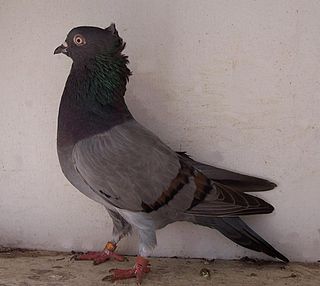
The Serbian Highflyer is a breed of domestic pigeon that is bred for endurance flying. The breed is characterized by long circle flights up to 15 hours. It can fly as high as 1,500 metres (4,900 ft). There are about 20,000 fanciers of this breed in Serbia.
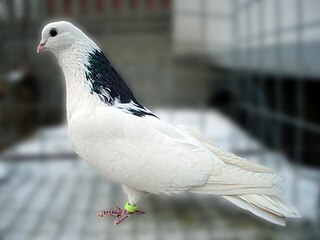
The Chistopolian Highflyer is a breed of fancy pigeon. Chistopolian Highflyers, along with other varieties of domesticated pigeons, are all descendants from the rock pigeon.
The Vienna Long-faced Tumbler is one of numerous breeds of tumbler pigeons, reared and exhibited for their ability to spin and tumble down suddenly whilst in flight. Originating in Austria, in and around Vienna, it is an old breed that was known there in the 17th century. It was introduced by the Turks and was crossed with the Barb. It was exhibited in Hamburg in 1867. Dürien (1886) described nine color varieties. In Germany this breed is considered a "medium-faced" one, but in the United States it is considered "long-faced." It mostly occurs in large cities within the United States, since it is usually brought to this country by immigrants.
The Madrasi Highflyer also known as Thavdal is a breed of performance pigeon developed over centuries for endurance flying. Thavdal, along with other breeds of domesticated pigeons are all descendants of the rock dove.















